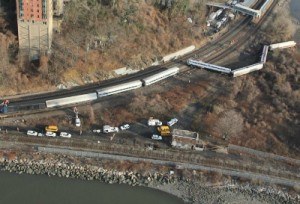

A sleep-deprived engineer nodded off at the controls of a commuter train just before taking a 30 mph curve at 82 mph, causing a derailment last year that killed four people and injured more than 70, federal regulators said Tuesday.
William Rockefeller’s sleepiness was due to a combination of an undiagnosed disorder – sleep apnea – and a drastic shift in his work schedule, the National Transportation Board said. It said the railroad lacked a policy to screen engineers for sleep disorders, which also contributed to the Dec. 1 crash. It also said a system that would have automatically applied the brakes would have prevented the crash.

The board also issued rulings on four other Metro-North accidents that occurred in New York and Connecticut in 2013 and 2014, repeatedly finding fault with the railroad.
“This would be almost a comedy of errors if it weren’t so tragic,” Sen. Chuck Schumer, D-N.Y., said Tuesday. “It’s clear these mistakes were avoidable.”
The NTSB had reported Rockefeller’s sleep apnea in April, saying tests revealed it interrupted his sleep dozens of times each night. Investigators said Rockefeller told them he had felt strangely “dazed” right before the crash. But until Tuesday it had refrained from declaring his sleepiness the cause of the crash.
It said that less than two weeks before the crash, Rockefeller had switched from a work day that began in late afternoon to one that began early in the morning. The board said that probably compounded his sleep problem.
It also noted that the technology known as positive train control was not in use at the time of the crash. Positive train control can automatically bring a train to a stop if it’s exceeding a speed limit. Metro-North has said it is working to install the technology.
On the other accidents, the NTSB found:
In March, the Federal Railroad Administration issued a stinging report on Metro-North, saying the railroad let safety concerns slip while pushing to keep trains on time. Railroad executives pledged to make safety their top priority.
Sen. Richard Blumenthal, D-Conn., said Monday that the new NTSB report documents “the cascading catastrophes over a single year illustrating the urgent need for dramatic upgrades and improvements in safety and reliability.”
Metro-North is the second-largest commuter rail line in the country. It carried more than 83.4 million riders between New York City and its suburbs last year.